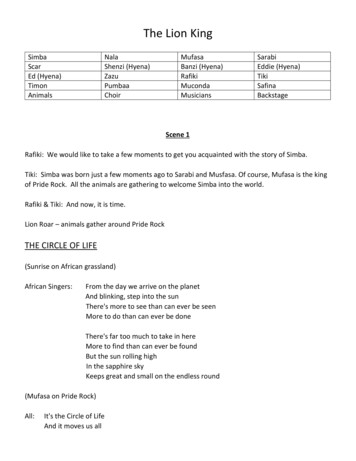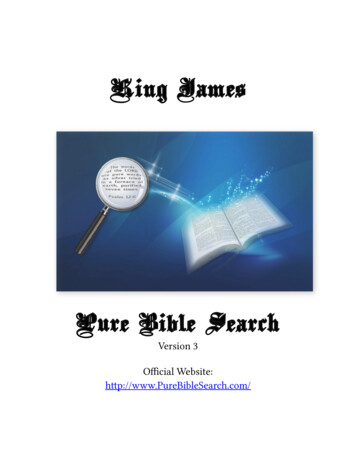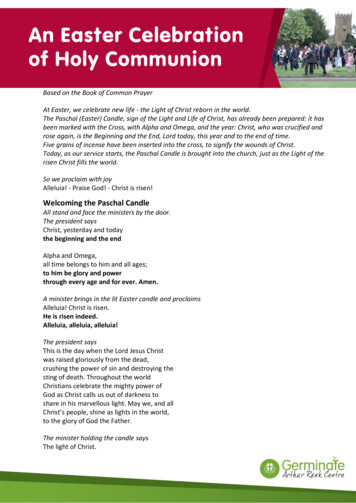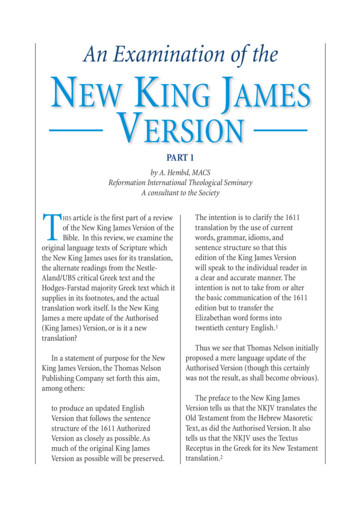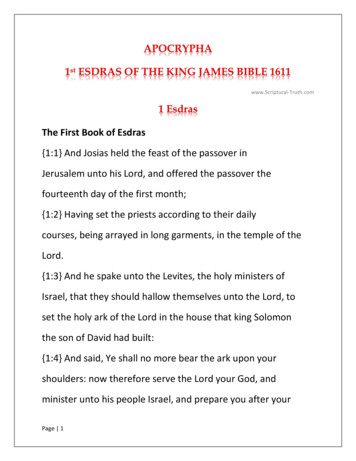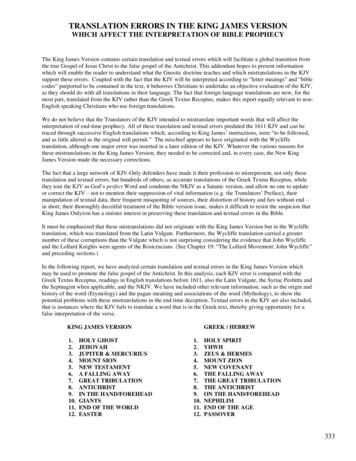
Transcription
TRANSLATION ERRORS IN THE KING JAMES VERSIONWHICH AFFECT THE INTERPRETATION OF BIBLE PROPHECYThe King James Version contains certain translation and textual errors which will facilitate a global transition fromthe true Gospel of Jesus Christ to the false gospel of the Antichrist. This addendum hopes to present informationwhich will enable the reader to understand what the Gnostic doctrine teaches and which mistranslations in the KJVsupport these errors. Coupled with the fact that the KJV will be interpreted according to ―letter meaings‖ and ―biblecodes‖ purported to be contained in the text, it behooves Christians to undertake an objective evaluation of the KJV,as they should do with all translations in their language. The fact that foreign language translations are now, for themost part, translated from the KJV rather than the Greek Textus Receptus, makes this report equally relevant to nonEnglish speaking Christians who use foreign translations.We do not believe that the Translators of the KJV intended to mistranslate important words that will affect theinterpretation of end-time prophecy. All of these translation and textual errors predated the 1611 KJV and can betraced through successive English translations which, according to King James‘ instructions, were ―to be followed,and as little altered as the original will permit.‖ The mischief appears to have originated with the Wycliffetranslation, although one major error was inserted in a later edition of the KJV. Whatever the various reasons forthese mistranslations in the King James Version, they needed to be corrected and, in every case, the New KingJames Version made the necessary corrections.The fact that a large network of KJV-Only defenders have made it their profession to misrepresent, not only thesetranslation and textual errors, but hundreds of others, as accurate translations of the Greek Textus Receptus, whilethey tout the KJV as God‘s perfect Word and condemn the NKJV as a Satanic version, and allow no one to updateor correct the KJV – not to mention their suppression of vital information (e.g. the Translators‘ Preface), theirmanipulation of textual data, their frequent misquoting of sources, their distortion of history and lies without end –in short, their thoroughly deceitful treatment of the Bible version issue, makes it difficult to resist the suspicion thatKing James Onlyism has a sinister interest in preserving these translation and textual errors in the Bible.It must be emphasized that these mistranslations did not originate with the King James Version but in the Wycliffetranslation, which was translated from the Latin Vulgate. Furthermore, the Wycliffe translation carried a greaternumber of these corruptions than the Vulgate which is not surprising considering the evidence that John Wycliffeand the Lollard Knights were agents of the Rosicrucians. (See Chapter 19: ―The Lollard Movement: John Wycliffe‖and preceding sections.)In the following report, we have analyzed certain translation and textual errors in the King James Version whichmay be used to promote the false gospel of the Antichrist. In this analysis, each KJV error is compared with theGreek Textus Receptus, readings in English translations before 1611, also the Latin Vulgate, the Syriac Peshitta andthe Septuagint when applicable, and the NKJV. We have included other relevant information, such as the origin andhistory of the word (Etymology) and the pagan meaning and associations of the word (Mythology), to show thepotential problems with these mistranslations in the end time deception. Textual errors in the KJV are also included,that is instances where the KJV fails to translate a word that is in the Greek text, thereby giving opportunity for afalse interpretation of the verse.KING JAMES VERSION1.2.3.4.5.6.7.8.9.10.11.12.HOLY GHOSTJEHOVAHJUPITER & MERCURIUSMOUNT SIONNEW TESTAMENTA FALLING AWAYGREAT TRIBULATIONANTICHRISTIN THE HAND/FOREHEADGIANTSEND OF THE WORLDEASTERGREEK / HEBREW1.2.3.4.5.6.7.8.9.10.11.12.HOLY SPIRITYHWHZEUS & HERMESMOUNT ZIONNEW COVENANTTHE FALLING AWAYTHE GREAT TRIBULATIONTHE ANTICHRISTON THE HAND/FOREHEADNEPHILIMEND OF THE AGEPASSOVER333
1.“GHOST” INSTEAD OF “SPIRIT” WITH REFERENCE TO JESUS CHRIST AND THE HOLY SPIRIT.―Jesus, when he had cried again with a loud voice, yielded up the ghost.‖ (Matt. 27:50 KJV)―Go ye therefore, and teach all nations, baptizing them in the name of the Father, and of the Son, and of theHoly Ghost:‖ (Matt. 28:19 KJV)GREEK TEXTUS RECEPTUSMatthew 28:19 4198 (5679) {GOING} 3767 {THEREFORE} 3100 (5657){DISCIPLE} 3956 {ALL} 3588 {THE} 1484 {NATIONS,} 907 (5723) {BAPTIZING} 846 {THEM} 1519 {TO} 3588 {THE} 3686 {NAME} 3588 {OF THE} 3962 {FATHER} 2532 {AND} 3588 {OF THE} 5207 {SON} 2532 {AND} 3588 {OF THE} 40 {HOLY} 4151 {SPIRIT;}TRANSLATION ERROR―Ghost‖ is a mistranslation of the Greek word ―pneuma‖ which means breath or spirit. The KJV inconsistentlytranslated the word pneuma as spirit or ghost, with 91 instances of Ghost or ghost referring to God. The word―Ghost‖ with reference to God, which is used in all English Bibles predating the King James Version, can betraced to the Wycliffe translation (1395). Although the Wycliffe Bible was translated from the Latin Vulgate,Jerome used the Latin term ―Spirtu Sancto‖ for the Holy Spirit and ―spiritum‖ for Jesus‘ spirit. Wycliffe didnot actually translate the Bible that bears his name; it was translated by other Lollard scholars at OxfordUniversity while Wycliffe led the Lollard movement politically. (See: Chap. 19 ―The Lollards: JohnWycliffe‖) These scholars would have been familiar with the famous Old English (Anglo-Saxon) epic poemBeowulf, which was based on a Germanic oral tradition; they would therefore have known that the Old Englishword gást and gaést from the Gothic word usgaisjan were used in the poem to describe monsters, i.e., dragonsand devils. The Wycliffe/Lollard translation of Eph. 6:17 is most inappropriate and disturbing: ―And take yethe helm of helthe, and the swerd of the Goost, that is, the word of God. That the Lollard scholars were―knights‖ is evident in their use of the word ―knyyt‖ or ―knyytis‖ 92 times in their translation, e.g., 2 Tim. 2:3:―Trauele thou as a good knyyt of Crist Jhesu.‖FALSE GOSPEL OF THE ANTICHRISTApplication of the word ―Ghost‖ to God the Holy Spirit may qualify as blasphemy of the Holy Spirit. (Matt.12:31) The word ―ghost‖ means ―spirit‖ in a demonic sense; it is the pagan term for the spirits of dead peoplewho are believed to roam on earth. ―Ghost‖ is derived from the Old English word gæstan (‗to frighten‘) and,apparently, from the Gothic word usgaisjan. It is a West Germanic word for a terrifying ‗supernatural being.‘Needless to say, the pagan connotation of the word ―ghost‖ (i.e., Halloween ghosts) makes it an inappropriateterm to identify God. This pagan usage may influence some unconverted persons to misunderstand the natureof God and to view Him as a Satanic being with evil intentions. In fact, Gnostic doctrine teaches that the Godof the Bible is Satan, and that the true God is Lucifer. (See: ―The Gnostic Gospel‖)― in antiquity and reality, Lucifer, or Luciferus, is the name of the angelic Entity presiding over the light oftruth as over the light of day. In the great Valentinian gospel Pistis-Sophia, it is taught that of the three Powersemanating from the Holy names of the three Triple powers (Tριδσνάμεις), that of Sophia (the Holy Ghostaccording to these Gnostics — the most cultured of all), resides in the planet Venus or Lucifer Lucifer isdivine and terrestrial light, the ‗Holy Ghost‘ and ‗Satan,‘ at one and the same time, visible Space being trulyfilled with the differentiated Breath invisibly; and the Astral Light ‖ (H.P. Blavatsky, The Secret Doctrine,Vol. II, p. 312)ETYMOLOGY / MYTHOLOGY―ghost. O.E. gast ‗soul, spirit, life, breath,‘ from P.Gmc. *ghoizdoz (cf. O.S. gest, O.Fris. jest, M.Du. gheest,Ger. Geist ‗spirit, ghost‘), from PIE base *ghois- ‗to be excited, frightened‘ (cf. Skt. hedah ‗wrath; Avestanzaesha- ‗horrible, frightful;‘ Goth. usgaisjan, O.E. gæstan ‗to frighten‘). This was the usual W.Gmc. word for‗supernatural being,‘ and the primary sense seems to have been connected to the idea of ‗to wound, tear, pull to334
pieces.‘ The surviving O.E. senses, however, are in Christian writing, where it is used to render L. spiritus, asense preserved in Holy Ghost. Modern sense of ‗disembodied spirit of a dead person‘ is attested from c.1385and returns the word toward its ancient sense. Most IE words for ‗soul, spirit‘ also double with ref. tosupernatural spirits. Many have a base sense of ‗appearance‘ (e.g. Gk. phantasma; Fr. spectre; Pol. widmo,from O.C.S. videti ‗to see;‘ O.E. scin, O.H.G. giskin, originally ‗appearance, apparition,‘ related to O.E.scinan, O.H.G. skinan ‗to shine‘). Other concepts are in Fr. revenant, lit. ‗returning‘ (from the other world),O.N. aptr-ganga, lit. ‗back-comer.‘ Bret. bugelnoz is lit. ‗night-child.‘ L. manes, lit. ‗the good ones,‘ is aeuphemism. The gh- spelling appeared c.1425 in Caxton, influenced by Flem. and M.Du. gheest, but was rarein Eng. before c.1550. Sense of ‗slight suggestion‘ (in ghost image, ghost of a chance, etc.) is first recorded1613; that in ghost writing is from 1884, but that term is not found until 1927. Ghost town is from 1931. Ghostin the machine was Gilbert Ryle‘s term (1949) for ‗the mind viewed as separate from the body.‘‖ (OnlineEtymology Dictionary)Barnhart Concise Dictionary of Etymology – devil, angel, etc.Oxford English Dictionary of Etymology –Sanskrit – anger; Gothic – terrifiedChambers Dictionary of Etymology – Indo European – enraged, aghast, terrifiedLiber Monstrorum: Monsters of Beowulf―gást, gaést, m. -a., m. -i., a Ghost, Spirit, Demon; creature; gaést, 102 ( Grendel), 2076(?) ( Grendel‘sMother), 2313(?) ( the Dragon); gs. (wergan) gástes, 133 ( Grendel), 1750 ( the Devil?); as. gást, 1276 ( Grendel); gp. gásta 1359, gaésta 1122 (fire). (note: it is sometimes difficult to decide whether (-)gæst (gist)or (-)gaést was intended) [cf. Go. usgaisjan ‗terrify‘] Cpds.: ellen-, ellor-, geósceaft-, wæl-.‖STRONG‟S CONCORDANCE#4151 – pneuma {pnyoo'-mah} from 4154; TDNT - 6:332,876; n nAV - Spirit 111, Holy Ghost 89, Spirit (of God) 13, Spirit (of the Lord) 5, (My) Spirit 3, Spirit (of truth) 3,Spirit (of Christ) 2, human (spirit) 49, (evil) spirit 47, spirit general) 26, spirit 8, (Jesus‘ own) spirit 6, (Jesus‟own) ghost 2, misc 21; 385NEW TESTAMENT GREEK LEXICONStrong‘s Number: 4151 pneuma from (4154)1.2.3.4.5.the third person of the triune God, the Holy Spirit, coequal, coeternal with the Father and the Sona. sometimes referred to in a way which emphasises his personality and character (the \Holy\ Spirit)b. sometimes referred to in a way which emphasises his work and power (the Spirit of \Truth\)c. never referred to as a depersonalised forcethe spirit, i.e. the vital principal by which the body is animateda. the rational spirit, the power by which the human being feels, thinks, decidesb. the soula spirit, i.e. a simple essence, devoid of all or at least all grosser matter, and possessed of the power ofknowing, desiring, deciding, and actinga. a life giving spiritb. a human soul that has left the bodyc. a spirit higher than man but lower than God, i.e. an angel1. used of demons, or evil spirits, who were conceived as inhabiting the bodies of men2. the spiritual nature of Christ, higher than the highest angels and equal to God, the divinenature of Christthe disposition or influence which fills and governs the soul of any onea. the efficient source of any power, affection, emotion, desire, etc.a movement of air (a gentle blast)a. of the wind, hence the wind itselfb. breath of nostrils or mouthPREVIOUS TRANSLATIONS & NKJVVERSIONNew King James Version (1979)MATT. 27:50, 28:19 et alHoly Spirit335
King James Version (1611)Bishops‘ Bible (1568)Geneva Bible (1587)Coverdale Bible (1535)Tyndale N.T. (1526)Wycliffe Bible (1395)Latin Vulgate (425)Syriac Peshitta (250)2.Holy Ghostholy ghostholy Ghostholy goostholy goostHooli GoostSpiritu SanctoHoly Spirit“JEHOVAH” INSTEAD OF “YHWH”―And I appeared unto Abraham, unto Isaac, and unto Jacob, by the name of God Almighty, but by my nameJEHOVAH was I not known to them.‖ (Exod. 6:3 KJV)―That men may know that thou, whose name alone is JEHOVAH, art the most high over all the earth.‖ (Psalm83:18 KJV)―Behold, God is my salvation; I will trust, and not be afraid: for the LORD JEHOVAH is my strength and mysong; he also is become my salvation.‖ (Isaiah 12:2 KJV)―Trust ye in the LORD for ever: for in the LORD JEHOVAH is everlasting strength:‖ (Isaiah 26:4 KJV)See also: ―Jehovah-jireh‖ (Gen. 22:14), ―Jehovah-nissi‖ (Exod. 17:15), ―Jehovah-shalom‖ (Judges 6:24)TRANSLATION ERROR―JEHOVAH‖ was not the name of God in the 1611 KJV, which translated the Hebrew name ―YHWH‖ as―IEHOVAH.‖ This spelling was changed to ―JEHOVAH‖ in a later edition of the King James Version; whichedition remains a mystery. IEHOVAH and JEHOVAH are both Masoretic corruptions of YHWH whichcombined the consonants of God‘s name and JHVH with the vowels of the name ―Adonai‖. The CoverdaleBible correctly translated YHWH as ―LORDE,‖ however, the KJV Translators chose to follow themistranslation of these verses in in the Bishops‘ Bible and Geneva Bible. The NKJV has the correct translation,LORD. The progression from ―IEHOVAH‖ to ―JEHOVAH‖ in later editions of the KJV reflects the insertion ofthe letter ―J‖ into the English alphabet which, however, occurred before translation of the 1611 KJV.FALSE GOSPEL OF THE ANTICHRISTThe name ―Adonai‖ is derived from the Canaanite title ―Adon‖ meaning ―Lord‖ and is the Hebrew cognate ofthe Greek god, Adonis. The Babylonian analogue of Adonis was the sun god, Tammuz, whose worship inancient Israel led to the Babylonian captivity. (Ezek. 8:14) In our day, the Astrotheologists are having a heydaywith this translation error, claiming that the God of Israel was Adonis.― theories (such as those discussed by Jonathan Z. Smith in his Drudgery Divine) which interpret the deathand resurrection of Jesus in the categories of the Hellenistic religions of Attis, Osiris, Adonis, etc. Judaism, too,was part of Oriental Hellenism. These other religions grew from Near-Eastern roots. When we prefer tounderstand Jesus as an analogue to Yahweh/Baal, what is the difference? Baal is already the same, pretty much,as Adonis/Adonai isn‘t he?―‗And here one wonders if Barker might not be willing to take her thesis a step farther and explain the originof the myth of Jesus‘ resurrection as one more piece of polytheistic Yahweh tradition. If Yahweh was in somany ways parallel to Baal the Son of Elyon, why should this not have extended to the death and resurrectionconcept? It was by a resurrection victory that Baal became king of the immortals. Why not with Yahweh?Perhaps this aspect of the earlier Yahweh cycle had been successfully expunged by the priestly editors. But, a laBarker, we may surmise that it, too, hung on in the popular and sectarian imaginations, emerging into the lightof history again when the theme was claimed for Jesus-Yahweh.‖ (The Great Angel, A Study of Israel's SecondGod. Reviewed by Robert M. Price. Institute for Higher Critical Studies)― the philosophical systems of the Gnostics and the primitive Jewish Christians, the Nazarines and theEbionites, show the views held in those days—outside the circle of Mosaic Jews—about Jehovah. He wasidentified by all the Gnostics with the evil, rather than with the good principle. For them, he was Ialdabaoth,336
‗the son of Darkness,‘ whose mother Sophia-Akhamoth, was the daughter of Sophia, the Divine Wisdom (thefemale Holy Ghost of the early Christians)—Akhasa‘ while Sophia-Akhamoth personified the lower AstralLight or Ether. Ialdabaoth or Jehovah, is simply one of the Elohim, the seven creative Spirits, and one of thelower Sephiroth. He produces from himself seven other Gods, ‗Stellar Spirits‘ (or the lunar ancestors*), for theyare all the same With Pagans and Christians, with Hindus and Chaldeans, with the Greek as with the RomanCatholics they were all the genii of the seven planets Such, in the opinion of the philosophical Gnostics,were the God and the Archangels now worshipped by the Christians!. fn. Jehovah‘s connection with the moonin the Kabala is well known to students.‖ (H.P. Blavatsky, The Secret Doctrine, Vol. I, pp. 197-8)HEBREW MASORETIC TEXT―and I appeared unto Abraham, unto Isaac, and unto Jacob, as God Almighty, but by My name YHWH I madeMe not known to them.‖ (Exod. 6:3)―That they may know that it is Thou alone whose name is the LORD, the Most High over all the earth.‖ (Psalm83:18)―Behold, God is my salvation; I will trust, and will not be afraid; for GOD the LORD is my strength and song;and He is become my salvation.‘‖ (Is. 12:2)―Trust ye in the LORD for ever, for the LORD is GOD, an everlasting Rock.‖ (Is. 26:4)―And Moses built an altar, and called the name of it Adonai-nissi.‖ (Gen. 22:14)―And Abraham called the name of that place Adonai-jireh; as it is said to this day: ‗In the mount where theLORD is seen.‘‖ (Exod. 17:15)―Then Gideon built an altar there unto the LORD, and called it ‗Adonai-shalom‘; unto this day it is yet inOphrah of the Abiezrites.‖ (Judges 6:24)JEWISH ENCYCLOPEDIA―JEHOVAH is an erroneous pronunciation of the Tetragrammaton, a four lettered name of God made up of theHebrew letters Yod He Vav He. The word ‗JEHOVAH‘ therefore is a misreading for which there is no warrantand which makes no sense in Hebrew.‖ (The Universal Jewish Encyclopedia)―JEHOVAH is a mispronunciation of the Hebrew YHWH the name of God. This pronunciation isgrammatically impossible. The form ‗Jehovah‘ is a philological impossibility.‖ (The Jewish Encyclopedia)PREVIOUS TRANSLATIONS & NKJVVERSIONNew King James Version (1979)King James Version (1611)Bishops‘ Bible (1568)Geneva Bible (1587)Coverdale Bible (1535)Tyndale N.T. (1526)Wycliffe Bible (1395)Latin Vulgate (425)Syriac Peshitta (250)EXODUS 6:3 et DETYMOLOGY / MYTHOLOGY“Jehovah. 1530, Tyndale‘s erroneous transliteration of Heb. Tetragramaton YHWH, using vowel points ofAdhonai ‗my lord‘ (see Yahweh). Used for YHWH (the full name being too sacred for utterance) in four placesin the Old Testament in the K.J.V. where the usual translation lord would have been inconvenient; taken as theprincipal and personal name of God. The vowel substitution was originally made by the Masoretes as adirection to substitute Adhonai for ‗the ineffable name.‘ European students of Heb. took this literally, whichyielded L. JeHoVa (first attested in writings of Galatinus, 1516). Jehovah‘s Witnesses ‗member of Watchtower337
Bible and Tract Society‘ first attested 1933; the organization founded c.1879 by Charles Taze Russell (18521916); the name from Isa. xliii:10.‖ (Online Etymology Dictionary)―Adonis. ‗a beau,‘ 1622, from Gk. Adonis, youth beloved by Aphrodite, from Phoenician adon ‗lord,‘ probablyoriginally ‗ruler,‘ from base a-d-n ‗to judge, rule.‘ Adonai, an O.T. word for ‗God,‘ is the Heb. cognate, with pl.of majesty.‖ (Online Etymology Dictionary)―‗Jehovah‘ is a modern mispronunciation of the Hebrew name, resulting from combining the consonants of thatname, Jhvh, with the vowels of the word Adonay, Lord,‘ which the Jews substituted for the proper name inreading the scriptures. In such cases of substitution the vowels of the word which is to be read are written in theHebrew text with the consonants of the word which is not to be read. The consonants of the word to besubstituted are ordinarily written in the margin; but inasmuch as Adonay was regularly read instead of theineffable name Jhvh, it was deemed unnecessary to note the fact at every occurrence. When Christian scholarsbegan to study the Old Testament in Hebrew, if they were ignorant of this rule or regarded the substitution as apiece of Jewish superstition, reading what actually stood in the text, they would inevitably pronounce the nameJehovah The statement still commonly repeated that it originated with Petrus.‘‖ (1911 EncyclopediaBritannica, Vol. 15, p. 314)―The pronunciation ‗Jehovah‘ is an error resulting among Christians from combining the consonants YHWHwith the vowels of ADHONAY.‖ (Encyclopedia Britannica)See: Chapter 2: ―The Tetragrammaton‖3.“JUPITER” & “MERCURIUS” IN PLACE OF “ZEUS” AND “HERMES”―And they called Barnabas, Jupiter; and Paul, Mercurius, because he was the chief speaker.‖ (Acts 14:12KJV)See also: Acts 14:13GREEK TEXTUS RECEPTUSActs 14:12 2564 (5707) 5037 3588 3303 {AND THEY CALLED} 921 {BARNABAS} 2203 3588 {ZEUS;} 1161 {AND} 3972 {PAUL} 2060 {HERMES,} 1894 {BECAUSE} 846 {HE} 2258 (5713) {WAS} 3588 {THE} 2233 (5740) 3588 {LEADER} 3056 {IN SPEAKING.}TRANSLATION ERRORMistranslation of ―Zeus‖ and ―Hermes‖ as ―Jupiter‖ and ―Mercurius‖ is dynamic equivalence in all of its glory.This misleading transliteration can be traced through all of the English Bibles to Jerome‘s Latin Vulgate whichused the Roman names of the Greek gods. The Wycliffe translation, which was based on the Latin Vulgate,brought Jerome‘s transliteration into the English Bible. And, even though William Tyndale translated fromErasmus‘ third edition of the Byzantine Greek text, he carried forward the Wycliffe error of using the Romannames of these Greek gods in English Bibles.The only reference in the KJV to ―Hermes‖ and ―Hermas‖ is to Christian brethren in Romans 16:14, hence, thename ―Hermes‖ has a good connotation. The Greeks of Lycaonia thought Paul was the god ―Hermes‖ comedown to earth from the stars because he was the ―chief speaker‖ and performed a great miracle. ―Mercurius‖does not have the name recognition of the Greek god, ―Hermes‖ and the translators of the Latin Vulgate andEnglish Bibles, being Classical scholars, should have understood the importance of identifying the Greek god―Hermes‖ in Acts 14:12. Paul commanded Timothy, ―Hold fast the form of sound words, which thou hastheard of me ‖ (2 Tim. 1:13) ―Hermes‖ is a ‗sound word‘ placed by God in the Greek text for a reason. TheNKJV has corrected this translation error.FALSE GOSPEL OF THE ANTICHRIST338
―Hermes Trismegistus‖ was a major Greek god whose identity is concealed by using the Roman name ofMercurius or Mercury. In his Genesis of the Grail Kings, Laurence Gardner identified Hermes as Ham, Noah‘srebellious son who survived the Great Flood. Ham, the father of Canaan whom Noah cursed, is revered byoccultists as the preserver of the pre-Flood ―ancient wisdom,‖ i.e., sorcery, which he taught to his descendants,the Merovingian bloodline. (See: Death of the Phoenix: Atlantis Rising) This ancient wisdom , also called the―Hermetic arts and sciences,‖ was the mystery religion that supposedly made Egypt a world power. Hermes isthe legendary Egyptian sage who is reputed to be the author of the Tarot, neo-Platonism, the Kabbalah, alchemyand astrology.The Hermetic arts and sciences were revived by Francis Bacon as The Advancement of Learning and theRosicrucians are now mainstreaming Hermetic sorcery (e.g. Harry Potter) to condition mankind for themiraculous wonders performed by the Antichrist and False Prophet during the Tribulation period. It is nocoincidence that Harry‘s female witch friend is named ―Hermione.‖ Since most people including Christianshave never heard of Hermes Trismegistus, the Rosicrucians will be able to reimage him as a good sorcerer, inthe same way they have portrayed white magicians Harry Potter and Hermione as white witches. And because―Hermes‖ was not identified in our English Bibles (except the NKJV) as a Greek god, even believers are at riskof believing that Hermetic magic to be performed by the Antichrist are miracles of God.STRONG‟S CONCORDANCE#2203 – Zeus – Jupiter or Zeus ―a father of helps‖, the national god of the Greeks and corresponds to theRoman Jupiter#2060 – Hermes – Hermes, perhaps from 2046; n pr m, Mercurius or Hermes ―herald of the gods‖1) a Greek deity called by the Romans Mercurius (Mercury)PREVIOUS TRANSLATIONS & NKJVVERSIONNew King James Version (1979)King James Version (1611)Bishops‘ Bible (1568)Geneva Bible (1587)Coverdale Bible (1535)Tyndale N.T. (1526)Wycliffe Bible (1395)Latin Vulgate (425)Syriac Peshitta (250)ACTS 14:12Zeus / HermesIupiter / MercuriusIupiter / MercuriusIupiter / MercuriusIupiter / MercuriusIupiter / MercuriusJubiter / MercurieIovem / Mercuriumchief of the gods / HermesETYMOLOGY / MYTHOLOGY―Hermes. 1605, son of Zeus and Maia, god of commerce and Olympian messenger, from Gk. Hermes, ofunknown origin.‖ (Online Etymology Dictionary)―Hermetic. 1605 (implied in hermetically), ‗completely sealed,‘ also (1637) ‗dealing with occult science oralchemy,‘ from L. hermeticus, from Gk. Hermes, god of science and art, among other things, identified byNeoplatonists, mystics, and alchemists with the Egyptian god Thoth as Hermes Trismegistos ‗Thrice-GreatHermes,‘ who supposedly invented the process of making a glass tube airtight (a process in alchemy) using asecret seal. (Online Etymology Dictionary)―The Tables of Testimony.not to be confused with the Ten Commandments.are rather more associated withthe original Table of Destiny of the Anunnaki. This ancient archive is directly associated with the EmeraldTable of Thoth/Hermes, and, as detailed in alchemical records of Egypt, the author of the preserved writingswas the Biblical Ham, a great Archon of the Grail bloodline. He was the essential founder of the esoteric andarcane ‗underground stream‘ which flowed through the ages and his Greek name, Hermes, was directly relatedto the science of pyramid construction, deriving from the word herma, which relates to a ‗pile of stones‘.‖(Laurence Gardner, Genesis of The Grail Kings: The Explosive Story of Genetic Cloning in the Bloodline ofJesus, 2000, p. 219)339
4.MOUNT “SION” INSTEAD OF MOUNT “ZION” IN PROPHECIES OF THE SECOND COMING OFJESUS CHRIST―Praise waiteth for thee, O God, in Sion: and unto thee shall the vow be performed. O thou that hearest prayer,unto thee shall all flesh come. ‖ (Ps. 65:1-2 KJV)―And so all Israel shall be saved: as it is written, There shall come out of Sion the Deliverer, and shall turn awayungodliness from Jacob:‖ (Rom. 11:26 KJV)―And I looked, and, lo, a Lamb stood on the mount Sion, and with him an hundred forty and four thousand,having his Father‘s name written in their foreheads.‖ (Rev. 14:1 KJV)TRANSLATION ERRORThe 1611 KJV mistranslated the Hebrew word for ―Zion‖ (tsiyown) as ―Sion‖ in many Psalms: 2:6, 9:11, 14;14:7; 20:2; 48:2, 11, 12; 50:2; 51:18; 53:6; 65:1, 69:35, 74:2: 76:2; 78:68; 97:8. All of these translation errorswere corrected except for Psalm 65:1. ―Sion‖ in Ps. 65:1 is not a spelling error but a translation error becausethe Hebrew word for ―Sion‖ is Siy’on, a different word than Tsiyown, which is translated ―Zion‖. The wordsTsiyown (Zion) and Siy’on (Sion) identify two different locations in Israel: Mount Zion in Jerusalem and MountHermon, also called Mount Sion, in northern Israel. Deuteronomy 4:48 states, ― Mount Sion (that is,Hermon)‖.This translation error is found in all of the English Bibles predating the KJV, except the Geneva Bible, and inthe Latin Vulgate (425 A.D.) which Jerome may have derived from the Greek Septuagint (c. 280-130 B.C.),although he translated the O.T. from the Hebrew Text. These mistranslations reveal that, in this verse, the KingJames Translators followed the Greek Septuagint, by way of the Bishop‘s and other English Bibles (except theGeneva), as well as the Latin Vulgate, instead of the Hebrew Text. (See: ―Revision of the 1611 KJV‖) Theerror was corrected in the NKJV.FALSE GOSPEL OF THE ANTICHRISTMount Hermon is named after the Greek god ―Hermes‖ who taught Hermetic magic to the Egyptians. Mt.Hermon is also called Mount Sion, presumably from Sirion, the name given to it by the Sidonians. (Deut. 3:8-9)Hermes came to earth to teach the Egyptians civilization and then returned to the stars, specifically the main starof the constellation Canis Major which is Sirius, the Dog Star. It is probable that Mount Sion/Sirion ultimatelyderived its name from the star Sirius which was, and still is, believed to be the location of the ancient gods whoescaped the Great Deluge on the good ship Argo, the constellation next to Canis Major in the Zodiacal chart.(See: ―The False Gospel in the Stars: Heaven‘s Gate‖)Mistranslation of the Hebrew word for Zion (Tsiyown) as Sion in Psalm 65:1 is important because this versewill provide Scriptural validation of the Antichrist who will return from ―heaven‖ and rule from MountSion/Sirion in Dan instead of Mount Zion in Jerusalem. At the Luciferic Initiation, the False Prophet will usePsalm 65:1 to coerce mankind to swear allegiance to Lucifer and receive his mark, the Seal of Solomon. (See:―The 6-Pointed Star: The Mark of the Beast‖) Compounding the problem, all seven New Testament referencesto Mount Zion in Jerusalem have not been been translated as ―Zion‖ in the KJV but left in the Greek as ―Sion.‖Five of these verses were fulfilled at the first coming of Jesus Christ, however, two verses pertain to the SecondComing – Rom. 11:26 and Rev. 14:1.STRONG‟S CONCORDANCE#7865 Siy‘on {see-ohn‘} from 7863; n pr mont AV - Sion 1; 1 Sion ―lofty‖1) another name for Mount Hermon#6726 Tsiyown {tsee-yone‘} the same (regularly) as 6725; TWOT - 1910; n pr loc AV - Zion 153, Sion 1; 154Zion parched place‖1) another name for Jerusalem especially in the prophetic books.“SION” instead of “ZION” in Matt. 21:5, John 12:15, Rom. 9:33, Rom. 11:26, Heb. 12:22, I Pet. 2:6, Rev.14:1 / misleading transliterati
―Ghost‖ with reference to God, which is used in all English Bibles predating the King James Version, can be traced to the Wycliffe translation (1395). Although the Wycliffe Bible was translated from the Latin Vulgate, Jerome used the Latin term ―Spirtu Sancto‖ for the Holy



